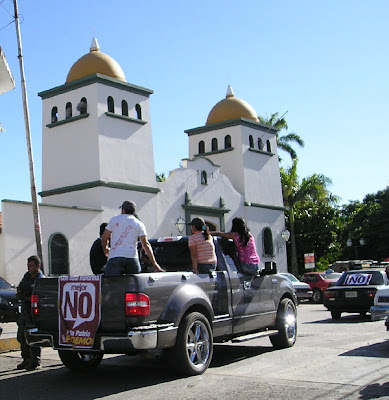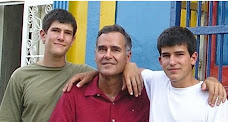 Unfortunately, horse can´t vote.
Unfortunately, horse can´t vote.There was a cloud sitting on the mountain at 7 a.m., and the first voters made their way through the fog on foot, on motorcycles, or on horseback. One of the first in line was Diluvín, who’s the maestro of welding steel and playing the violin in Monte Carmelo, and also the man who looks after the complicated old pipeline that brings water down from the mountain forests. The neighbors say he’s a genius because he can figure out how to make anything. He was ready to cast his vote for the “Si!”
 Around 10 a.m. the sun was shining brightly and people who had already voted were sitting on the wall next to the polling place which was located in the elementary school. The voters were chatting with each other and happy to share a few thoughts about the vote and the constitutional reforms. Yocelin Gonzalez said, “My opinion is that we should support the reforms because this is the way that we can assure a brighter future for our children. So I say: Si! Si! Si!”
Around 10 a.m. the sun was shining brightly and people who had already voted were sitting on the wall next to the polling place which was located in the elementary school. The voters were chatting with each other and happy to share a few thoughts about the vote and the constitutional reforms. Yocelin Gonzalez said, “My opinion is that we should support the reforms because this is the way that we can assure a brighter future for our children. So I say: Si! Si! Si!”Isidro Garcia, a retired farmer I had talked to the week before, had a message for people in the United States. “This guy Bush should not be meddling in Venezuela,” he said, “he should be helping all the poor people in his own country. Venezuelan people aren’t against the North Americans or the United States. We just want to be able to pursue our own political course.”
As Isidro was talking to me, a member of the Army Reserve came over and asked us, very politely, to move about thirty feet away from the gate to the school where people were waiting in line to vote. He didn’t want our conversation to influence people who had not voted yet. There was absolutely no election propaganda - no signs, buttons, or cards - anywhere in the village suggesting how people should vote. And the voting system is a dream: one kind of electronic voting machine is used all over the country and it is able to print out paper copies of each completed ballot (which are then deposited in boxes for recounts, if necessary). Just think, if we in the United States had had such an efficient and fraud-proof system, then Bush would not be our President.
At 11 a.m. Boni Gomez, a school administrator from Sanare and a local coordinator on behalf of the “Si!” vote, drove up the mountain in his little red car and informed us that about 35% of the electorate had already turned out to nationwide. They were hoping for at least a 50% turnout, he said. (But 50% of whom? I wondered.)
After lunch I listened to our neighbor, Abigail, who had worked as one of the local election officials for the past four elections, but was happy to be replaced by others this year. The committee had started setting up tables, etc. in the polling place at 5 a.m. and would not leave the school until after 8 p.m. She explained that “the election is very important because the reforms will provide the laws that can advance the peaceful socialist revolution that the president is leading. This is a key moment if we are going to be able to replace the strong capitalist influences that are preventing socialist measures from being implemented.
“Of course, the richest people are opposed to the reforms because their power will be limited in the future. That’s why they have frightened some of the poor people with their propaganda, saying that the government wants to seize their land. I know one man who believes that his tiny parcel of land is in danger, so now he just went and voted “No.” He did this even though he just received a low-interest loan from Fundafe, a government agency, so he could make improvements to his land.”
Around four p.m. I joined Carmen, her granddaughter Paola, and some other people who were sitting in the sun in the plaza in front of the church. “First,” said Carmen, “I want to send a greeting to the people of the United States from the people of Venezuela. Once again we’re demonstrating how to fortify the democratic process in a very civil and peaceful manner. All of our ten elections since 1998 have been very responsible and aboveboard.”
Just then, Pepi walked up, gave Carmen a big hug, and said, “We’re always voting on opposite sides but we still love each other.”
 “See,” replied Carmen as she turned to me, “we can live together in friendship even though some of us are with the Bolivarian Process and some are against it.”
“See,” replied Carmen as she turned to me, “we can live together in friendship even though some of us are with the Bolivarian Process and some are against it.”Some of the other old-timers, like Joel, Pascual, and Miguelito, have strong loyalties to Adeco, or Acción Democratica, the old Social Democratic party that was a major force in Venezuela and local politics for many decades, but now has only a tiny following. All of them were in danger of going blind from cataracts and other eye maladies that are common here, so they were flown to Cuba by “Misión Milagro” (the Miracle Mission) for eye surgery. Now, they’re happy to have their eyesight restored, but that doesn’t mean they are about to abandon their political loyalties – there’s no way will they ever vote for Chavez.
Diluvín, who had been one of the first to vote, joined the conversation around 5 p.m. as the polls were closing because nobody was waiting in line. By 5:30 the sun was getting low in the West and the air was getting chilly, so most people retreated to the warmth of their houses, and Diluvín and I were left alone. “I wish more of the other campesinos could read better,” he confided, “then they would know how many things in this new constitution are going to benefit them. There were an awful lot of Articles to read through in the reforms. I’m afraid that some of them didn’t bother to vote.”
Monte Carmelo votes overwhelmingly for “Si!” The nation votes “No!”
As it turned out, Diluvín did not need to worry about his fellow campesinos, at least those around Monte Carmelo. By 8 p.m. we knew that three hundred and three citizens had turned out to vote and they supported the Reforms overwhelmingly, 255 to 46. In neighboring Bojó, the response was similar, 225 to 34.
But elsewhere, in other hamlets and in the poorer barrios of the town of Sanare (the county seat has about 25,000 inhabitants), there was a high degree of abstention, at least compared to the presidential election of December 2006. This time the nationwide participation rate was 56%, very high compared to off-year elections in the United States (when there is no presidential election and somewhere between 30% and 40% of the people vote), but low compared to the 75% who voted last year in Venezuela.
Around 8 p.m. we also learned that in Sanare, where about 70% of the voters chose Chavez in 2006, a majority of the voters voted narrowly for “No” on the constitutional reforms. This turned out to be a reliable indicator of national sentiment, but we had to spend hours waiting for the first bulletin of electoral results. It was clear to us the tally was going to be very close or they would have made an announcement earlier. Around 11 p.m. I said goodnight to some friends and their TV set, returned to our little house and fell asleep.
I kept sleeping, not knowing that at 1:15 a.m. they announced that the “No” vote had triumphed. According to my neighbors who stayed up, President Chavez handled the news graciously. He appeared on TV and acknowledged that the result was fair and, even though his proposed reforms had been defeated, this was the way that a democracy was supposed to function.
At 6:30 a.m. on Monday I wandered into the house next door to get our yogurt (we use their refrigerator since we don’t have one), and Abigail told me the news: “We lost. The “No” won.”
The she added, “Perdimos la batalla, pero vamos a ganar la guerra.” (‘We lost the battle, but we’re going to win the war’ – a line that would be repeated several times by the residents of Monte Carmelo on Monday.) She kept patting the arepas, the fat tortillas that she was making for breakfast, and added calmly, but with determination,“We just have to keep working and the revolution will go forward.”
I woke my son Ari up at 7, told him the bad news, and then the good news: “Abigail says its time to go to work.” Not political work, but harvesting work. From 7 to 10 we helped Abigail, Gabriel, and their family pick coffee from the trees that grow directly in front of our two houses, and then, from 10 to 12, we picked and husked corn in the large garden area on the west side of their house.
 Life goes on, a campesina’s work is never done.
Life goes on, a campesina’s work is never done.By afternoon the physical labor had cleared up my foggy brain cells, and I was ready to digest some numbers that were delivered by Sandino, the twenty year-old activist who lives down the road. Sandino reported that the voter turnout nationwide on Sunday had fallen by three million people compared to the number of voters who participated in the presidential election of 2006. This was, more or less, the margin of victory that Chavez had enjoyed in that election. It appeared that the referendum on the constitutional reforms had failed because so many Chavista supporters did not turn out to vote. Three million people abstained.
On Monday, the day after the election, some of the “No” supporters enjoyed a little parade around the main plaza in Sanare to celebrate their victory. Previously Sanare had given about 70% of its votes to Chavez.













No comments:
Post a Comment